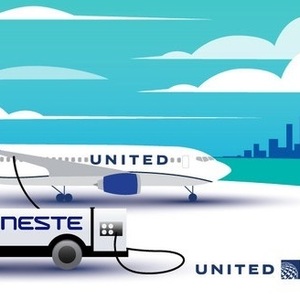United signs SAF agreement with Neste

May 10, 2022
BY United Airlines
United, which has invested in more sustainable fuel production than any other airline in the world, became the first US airline to sign an international purchase agreement for sustainable aviation fuel (SAF).
The airline has signed a new purchase agreement with Neste that provides United the right to buy up to 52.5 million gallons over the next three years for United flights at Amsterdam's Schiphol Airport, and potentially other airports as well.
United has signed a new international purchase agreement with Neste for sustainable aviation fuel (SAF).
Advertisement
Advertisement
"Reducing carbon emissions from fuel is the fastest way United will reach our 100 percent green goal by 2050. As the airline that has invested more than any other airline in sustainable aviation fuel production, it makes sense to expand our network of partners internationally with a leading company like Neste," said Lauren Riley, United's Chief Sustainability Officer. "The demand from our customers to limit their emissions from flying is growing exponentially, and this agreement means that United customers flying from Amsterdam, and potentially more airports, will be partners in our sustainability efforts."
Neste will provide United with 2.5 million gallons of SAF in Amsterdam in the first year. United will also have the right to purchase up to 20 million gallons in the second year, and up to 30 million gallons in the third year, at Amsterdam or other locations that Neste can supply throughout the globe, as Neste increases its SAF production.
This supply agreement is enabled by Neste's ambitious growth strategy, which will see the company producing 515 million gallons of SAF (1.5 million metric tons) per year by the end of 2023. Neste has been producing and delivering SAF since 2011 and has a proven track record of supplying SAF to customers in Europe, Asia and the Americas.
"We're excited to be partnering with United in this milestone purchase agreement and make our SAF available to United, also an industry leader in SAF investments," said Thorsten Lange, Executive Vice President, Renewable Aviation at Neste. "Our global, fast-growing SAF production and supply chain supports airlines and their customers in reducing greenhouse gas emissions. Neste is committed to helping aviation transition to a more sustainable future, and we look forward to expanding our cooperation with United."
Advertisement
Advertisement
SAF delivers the performance of conventional jet fuel but with a significantly smaller carbon footprint on a lifecycle basis. Neste's SAF reduces lifecycle greenhouse gas emissions (GHG) by up to 80 percent compared to conventional jet fuel and burns cleaner than conventional jet fuel reducing non-CO2 emissions, including particulate matter (PM). Neste MY Sustainable Aviation Fuel is produced from 100 percent sustainably sourced renewable waste and residue raw materials, including used cooking oil and animal fat waste.
United has aggressively pursued strategic investments in SAF producers and revolutionary technologies including carbon capture, hydrogen-electric engines, electric regional aircraft, and urban air mobility. United has invested in more SAF production than any other airline globally.
Related Stories
The European Commission on July 18 announced its investigation into biodiesel imports from China is now complete and did not confirm the existence of fraud. The commission will take action, however, to address some systemic weaknesses it identified.
Kintetsu World Express Inc. has signed an additional agreement with Hong Kong, China-based Cathay Pacific Airways for the use of sustainable aviation fuel (SAF). The agreement expands a three-year partnership between the two companies.
Broco Energy on July 17 announced a new partnership with the Massachusetts Port Authority (Massport) to deliver and transition Massport's fuel tanks to renewable diesel across its various facilities.
Shell Aviation, Accenture, and Amex GBT on July 10 announced Avelia is in the process of evolving to an industry solution with independent data hosting and a multi-supplier model helping users access the GHG benefits of SAF.
The U.S EPA on July 17 released data showing more than 1.9 billion RINs were generated under the RFS during June, down 11% when compared to the same month of last year. Total RIN generation for the first half of 2025 reached 11.17 billion.
Upcoming Events










